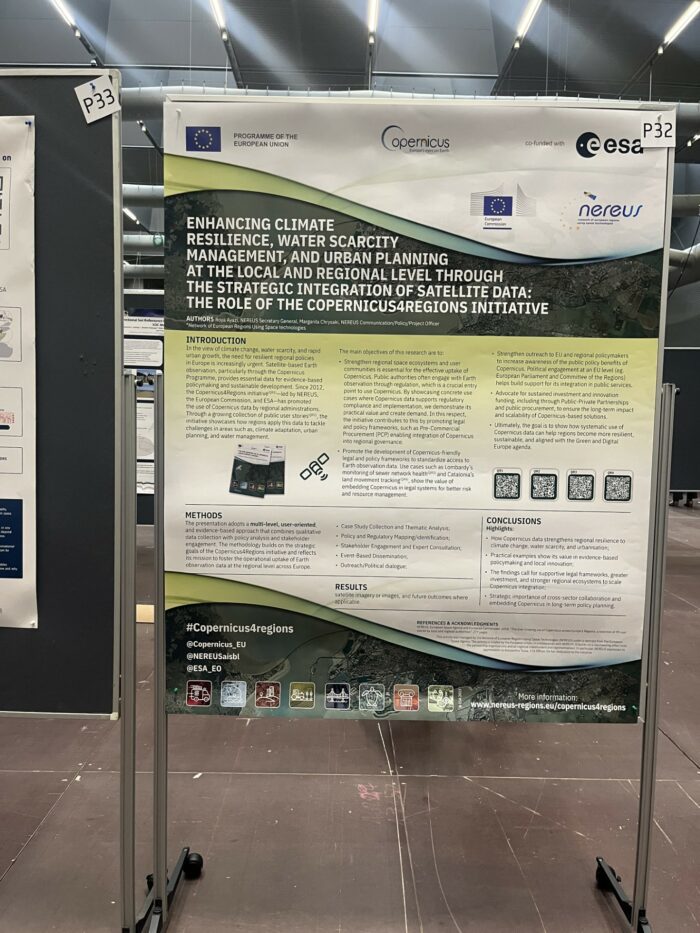Reinforcing its longstanding commitment to advancing the regional uptake of space applications, NEREUS played a prominent role at the ESA Living Planet Symposium 2025 in Vienna through a strong presence and co-organisation of strategic sessions under the Copernicus4regions umbrella. Over two days, NEREUS engaged with institutional stakeholders, experts, and end-users via a high-impact poster session and an interactive breakfast meeting—both underscoring the essential role of Earth Observation (EO) in empowering regional governance and evidence-based policymaking.
Poster Presentation – “Earth Observation in Governance: Bridging Data and Decision-Making”
Held on 23 June 2025 in the Poster Area, this session spotlighted tangible use cases from the Copernicus4regions collection, illustrating how satellite data strengthens public policy design and implementation at the regional and local levels. The exhibit drew considerable attention from symposium participants, many of whom praised the clarity and relevance of the presented examples. The lively interest and follow-up discussions confirmed that Earth Observation is increasingly recognised as a powerful tool in addressing climate resilience, biodiversity preservation, and urban development challenges through smarter governance.
Copernicus4regions Early Breakfast Meeting – A Forum for Exchange and Reflection
On the morning of 24 June, NEREUS and ESA co-hosted the Copernicus4regions Early Breakfast Meeting—an intimate and focused networking session that brought together over 30 participants, including regional users, service providers, institutional partners, and contributors to the initiative. The event fostered valuable exchanges, giving voice to multiple perspectives from across the Copernicus ecosystem.
Opening the session, Alessandra Tassa (ESA) and Roya Ayazi (NEREUS) provided an overview of the initiative’s evolution and emphasized its growing relevance in empowering local communities and fostering interregional collaboration through Copernicus.
The keynote intervention by Eliza-Maria Link (Department of Innovation and Digitalisation, UIV Urban Innovation Vienna GmbH) offered a compelling example of EO’s practical application in Vienna’s digital and climate transition strategies. She presented how spatial data is actively shaping urban policies, promoting innovation, and driving more efficient, future-proof solutions for city management.
The breakfast meeting also served as an opportunity to reflect on the progress of the new Copernicus4regions edition. Margarita Chrysaki (NEREUS) shared updates on the ongoing peer review process for the 36 newly submitted user stories and demonstrated the initiative’s redesigned search engine, aimed at improving accessibility and thematic navigation.
Participants—ranging from authors and reviewers to institutional actors—actively discussed their experiences preparing and assessing user stories, exchanging feedback on content quality, peer review criteria, and potential future themes for exploration. Simon Seminari (European Commission) reinforced the strategic role of Copernicus in regional policy implementation and emphasized the EU’s continued support for initiatives that empower local actors through space-based tools and insights.






